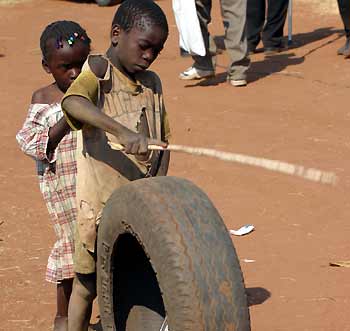World Bank
Western economic attacks against Arab democracy

By Patrick Bond
June 1, 2011-- Rosa Luxemburg Foundation Palestine office, posted at Links International Journal of Socialist Renewal with permission -- In their latest documents and meetings, the G8, the World Bank and the International Monetary Fund (IMF) reacted to the democratic movements in the Arab world: The recipe calls – as it did before the popular ousting of the Tunisian and Egyptian presidents – for privatisation, austerity measures and “market liberation”. Patrick Bond, economic advisor to the new South African government from 1994-2002, analyses the ramifications of the economic campaign on Tunisia, Egypt, Libya and Palestine.
Washington’s seeding of the Arab democratic revolution
World Bank’s neoliberal Africa strategy signals worsening uneven development

By Patrick Bond
May 30, 2011 -- Links International Journal of Socialist Renewal -- A renewed wave of development babble began flowing soon after the February launch of the World Bank’s 10-year strategy document, Africa's Future and the World Bank‘s Support to it. Within three months, a mini-tsunami of Afro-optimism swept in: the International Monetary Fund’s Regional Economic Outlook for SubSaharan Africa, the Economic Commission on Africa’s upbeat study, the African World Economic Forum’s Competitiveness Report and the African Development Bank’s discovery of a vast new “middle class” (creatively defined to include the 20% of Africans whose expenditures are US$2-4 a day).
Are ‘African lions’ really roaring? Latest fibs from world financiers

Africans who spend between US$2-$20 a day are now "middle class", says the African Development Bank chief eco
African agriculture and the World Bank: Development or impoverishment?
By Kjell Havnevik, Deborah Bryceson, Lars-Erik Birgegård, Prosper Matondi & Atakilte Beyene
December, 2007 -- Agriculture's dominant role in Sub-Saharan Africa's local, national and regional economies and cultures throughout pre-colonial history has been foundational to 20th century colonial and post-colonial development. No other continent has been so closely identified with smallholder peasant farming. Nonetheless, smallholder farming has been eroding over the last three decades, perpetuating rural poverty and marginalising remote rural areas. Donors' search for rural ``success stories'' merely reinforces this fact. Certainly many farmers have voted with their feet by increasingly engaging in non-agricultural livelihoods or migrating to urban areas. In so doing, the significance of agriculture for the majority of Africa's population has altered.


![[Source Unknown] [Source Unknown]](http://www.jadaliyya.com/content_images/3/egypt-protest-sign.jpg)